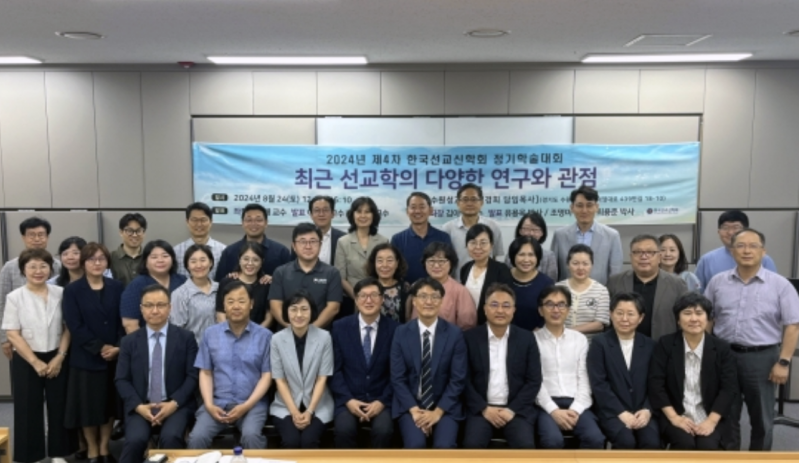
A recent mission conference in South Korea highlighted the issue of suicide prevention as a missiological concern amid a suicide rate more than twice the average among OECD countries. A missiologist professor argued that suicide should no longer be regarded solely as an individualized issue but something that affects society as a whole. And he believes that the Christian perspective of building God’s kingdom could help overcome the prevalent "culture of death".
On the afternoon of August 24, 2024, the Korean Society of Mission Studies, led by Professor Bo-kyung Park, held its 4th Annual Academic Conference at Suwon Seong Church in Suwon, Gyeonggi Province, South Korea, under the theme "Recent Research and Perspectives in Missiology."
During a session chaired by Professor Byung-bae Hwang from Hyupsung University, Missiology Professor Sung-gon Lee from the Presbyterian University and Theological Seminary presented on the topic "A Missional Approach to Suicide: Focusing on Responses to Factors Influencing Suicide", with Professor Nam-hyuk Jang from Seoul Theological Seminary providing a response.
Three categories of suicide causes
Professor Lee began by stating that "suicide is one of the most serious social problems worldwide. According to the World Health Organization (WHO), approximately 800,000 people die by suicide every year, which means one person dies by suicide every 40 seconds."
He highlighted that according to the 2023 Suicide Prevention White Paper (Ministry of Health and Welfare, 2023), South Korea has the highest suicide rate among OECD countries. The recent average suicide rate among OECD countries is 11.1 per 100,000 people, while South Korea's age-standardized suicide rate is 24.1 (2020), more than 2.2 times higher than the OECD average.
"People choose suicide for various reasons," Professor Lee noted. "Suicide is often reduced to personal economic factors, mental health issues, or other specific circumstances. In our society, suicide has long been socially tabooed or dismissed as an inevitable personal choice. However, with about 1.5 people choosing to end their lives every hour, we can no longer view it solely as an individual issue."
He then classified the causes of suicide into three major categories: "The first is desensitized learning, where suicide is not seen as a serious problem and is chosen as a solution to issues. The second category involves a lack of belonging and communication, leading to extreme isolation and depression. The third is the belief that one is a burden to others, even though this may not be the case, but it is how the individual perceives it."
He pointed out that "this tendency is particularly prevalent among the elderly. If they believe they are a burden to someone during their later years, it becomes psychologically challenging for them. These various causes threaten the precious lives of individuals, leaving close family members and others deeply wounded and in pain."
The far-reaching impact of suicide
"Although suicide may appear to be a solution to personal problems, its impact is far more extensive," Professor Lee explained. "It deeply and persistently affects the emotions of guilt and anger in surviving family members, friends, and relatives. Consequently, suicide has a profound impact not only on close acquaintances but also on the broader community, functioning as a highly contagious social disease. Suicide results from a complex interplay of psychological distress, as well as economic, social, and cultural factors."
He pointed to significant socioeconomic costs, such as the economic burden from loss of productivity, and the mental health and healthcare costs of those affected by suicide attempts and their aftermath. "Therefore, addressing these broad social determinants is crucial for effective suicide prevention," he commented.
"Existing methods of suicide prevention and treatment have primarily focused on medical, psychological, and sociological approaches. In Christianity, research on suicide has predominantly centered on practical theology, Christian counseling, Christian ethics, and Christian education."
However, he then pointed out that "despite the missional significance of the issue of suicide, there has been little research on suicide within missiology. Christian faith emphasizes the sanctity and dignity of life, teaching that all life is a precious gift from God. A missional approach to the issue of suicide contributes not only to social prevention and treatment but also fulfills God's will to create a culture of life, driving out the culture of death, and expanding and restoring God's kingdom."
Suicide: not just an individual problem but deeply tied to social structures
Aiming to approach the serious social issue of suicide from a missional perspective, Professor Lee said he analyzed data from the Korean General Social Survey to identify factors influencing suicide and to reconsider the missional role of Christianity. "As the analysis results show, missional responses tailored to various factors are necessary," he said.
He stressed that the finding that Christian religiosity is not significantly related to attitudes toward suicide requires strong critical reflection.
"Life is a gift from the Creator God to humanity. The church, as a missional church, must urgently repent and prioritize the value and protection of life. By providing both spiritual care and practical mental and emotional support, the church can reduce the risk of suicide and offer stability and hope to the families of those who have lost loved ones to suicide," he said.
"Since suicide is not merely an individual problem but is deeply connected to social structures, we must address social issues from a missional perspective and pursue changes in the entire social structure," Professor Lee argued.
The church should collaborate with the community to develop and implement various programs for suicide prevention. Efforts should include not only those of churches and mission organizations but also partnerships with local institutions, schools, hospitals, and other entities to build a suicide prevention network and unite for a common goal, he believes.
"By doing so, we can build an effective system for suicide prevention and respond missionally to the issue of suicide on a broader scale. Even now, there are precious neighbors trapped in a culture of death without hope. There are neighbors wandering in darkness, consumed by guilt and anger after losing loved ones to suicide. Our mission is to establish God's kingdom together with them," he concluded.
Nurturing and raising awareness among church members
In his subsequent response, Professor Jang said, "This paper attempts a missional approach to the issue of suicide. The author clearly demonstrates that the issue of 'suicide' is a subject of missiological reflection and a task of missional practice. The paper particularly points out how the traditional concept of 'mission' can be an obstacle or hindrance in addressing the issue of suicide."
He acknowledged that "the paper effectively shows that a holistic approach allows us to approach the issue of suicide more practically. It particularly illustrates how the church can respond more actively to the issue of suicide when it restores its missional essence."
While the paper suggests the direction and specific forms that a missional approach to the issue of suicide should take, providing motivation for the Korean church to pursue change, Professor Jang cautioned: "However, for churches to adopt the implications of this approach and to engage in collective efforts to address the issue of suicide, it is just as important to work on nurturing and raising awareness among church members as it is to focus on the external approaches."
"Regarding suicide, I believe that more three-dimensional nurturing and training are necessary to help church members understand and address the issue as citizens of God's kingdom, rather than through traditional, doctrine-focused, one-way education.
"In some respects, aspects of spiritual warfare training should be included as part of such nurturing," Professor Jang suggested, adding that "If the paper could address these aspects of member training and nurturing more thoroughly, it would likely lead to more practical changes."
This article discusses suicide. If you struggle with suicidal ideation, there is help available.
Originally published by Christian Daily Korea. Translated and edited by Christian Daily International staff.





